

How to Prevent Other Financial Crises. Preventing Capture: Special Interest Influence in Regulation, and How to Limit It. Edited by Daniel Carpenter (Harvard University) and David Moss (Harvard Business School), Cambridge University Press, 2013 Now available for purchase Cambridge University Press book page here.
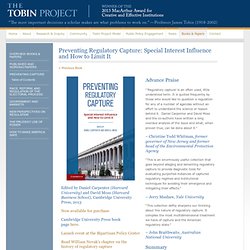
Launch event at the Bipartisan Policy Center Read William Novak's chapter on the history of regulatory capture Table of Contents PrefaceThe Tobin Project IntroductionDaniel Carpenter, Freed Professor of Government, Harvard UniversityDavid Moss, John G. Section Introduction 1. 2. 3. 4. Reforming the OTC Derivatives Market. Remarks at the Harvard Law School's Symposium on Building the Financial System of the 21st Century, Armonk, New YorkAs prepared for delivery It is a great pleasure to have the opportunity to speak here.
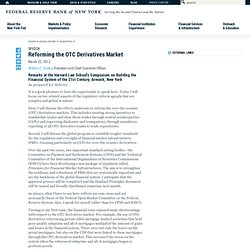
Today I will focus on two related aspects of the regulatory reform agenda that are complex and global in nature. First, I will discuss the efforts underway to reform the over-the-counter (OTC) derivatives markets. This includes creating strong incentives to standardize trades and clear those trades through central counterparties (CCPs) and improving disclosure and transparency through mandatory reporting of all OTC derivative trades to trade repositories.
Why Bankers Need to Be Put Into Little Boxes - Justin Fox. By Justin Fox | 8:45 AM June 3, 2011 There’s a beguiling little moment in the financial-crisis documentary Inside Job where hedge fund billionaire George Soros describes the principles of oil tanker design.
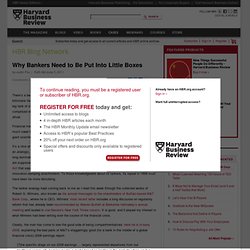
If a tanker consisted of one big tank of oil, the sloshing liquid would soon capsize the vessel, Soros explains. So tankers are comprised of lots of smaller, separate tanks, which keeps the sloshing in check and the ships afloat. Financial markets are like that, Soros goes on. If they’re compartmentalized, the risk of crisis is much lower than if all sorts of financial products and institutions are allowed to mix together in a giant sloshfest. It’s a nice analogy. Confessions of a Financial Deregulator - J. Bradford DeLong. Exit from comment view mode.
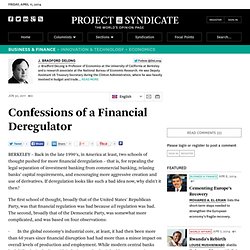
Click to hide this space BERKELEY – Back in the late 1990’s, in America at least, two schools of thought pushed for more financial deregulation – that is, for repealing the legal separation of investment banking from commercial banking, relaxing banks’ capital requirements, and encouraging more aggressive creation and use of derivatives. If deregulation looks like such a bad idea now, why didn’t it then?
The first school of thought, broadly that of the United States’ Republican Party, was that financial regulation was bad because all regulation was bad. The second, broadly that of the Democratic Party, was somewhat more complicated, and was based on four observations: · In the global economy’s industrial core, at least, it had then been more than 60 years since financial disruption had had more than a minor impact on overall levels of production and employment.
Romney’s Lead Economist Urges Policies that will Cause the Next Financial Crisis. Bill Black, the author of The Best Way to Rob a Bank is to Own One and an associate professor of economics and law at the University of Missouri-Kansas City.
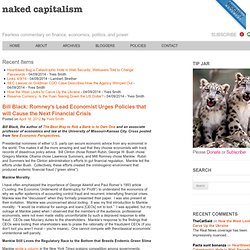
Cross posted from New Economic Perspectives. Presidential nominees of either U.S. party can secure economic advice from any economist in the world. Regulators should encourage more diversity in the financial system. Charles A.E. Goodhart, Wolf Wagner, 12 April 2012 The latest round of international financial regulations – known as Basel III – is making important steps towards a safer financial system. However, we believe it ignores a key aspect of systemic risk – the lack of diversity across financial institutions.
While up to a few decades ago the financial system consisted of predominantly small institutions that specialised in different businesses and had relatively few interlinkages with each other, this picture has dramatically changed. Financial institutions – in particular the very large ones – have become very similar to each other. This lack of diversity is very costly for society. A more homogenous financial system also means that contagion effects are likely to be more pronounced. There are several margins at which diversity in the financial system can be improved. Related to the issue of risk management, homogenous behaviour further results from similar trading strategies.
How to Prevent Other Financial Crises_Taleb. 10 Steps To Prevent the Next Bank Crisis. Stacy Mitchell: Why Republicans Hate Warren's CFPB But Love Another Bank Regulator. Why banks are under-taxed and what to do about it. What new policies should be included in financial and regulatory reforms?

This column argues that banks are under-taxed along many dimensions and analyses a proposed broad tax on financial-sector income. The banking crisis of 2008-2009 was very costly to national public finances – in some countries, it was ruinous. As governments try to regain their fiscal footing, the spotlight naturally turns to the fiscal contribution made by the financial sector. There are several reasons to believe that banks are currently under-taxed. Their crises have large negative effects on the overall economy, they benefit from underpriced bail-out guarantees, they receive cheap central-bank funding, and, not least, in the EU they enjoy low value-added taxation (VAT) in the form of the VAT exemption.1.